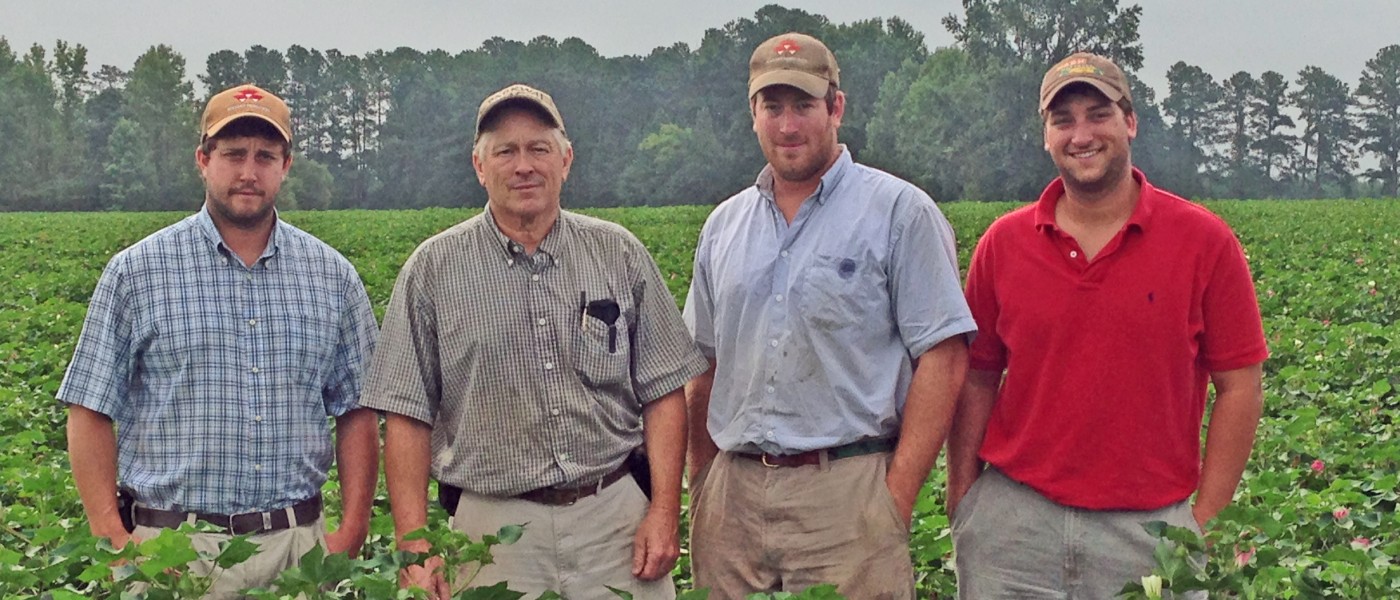Hickory Meadows Organics might seem like your typical organic farm with popular products like corn, soybeans and sweet potatoes, but it also played an important role in the making of a t-shirt many will wear at Farm Aid 2014.
In 2011, Orpha Gene Watson started growing organic cotton forTS Designs, a t-shirt company based in North Carolina with a commitment to eco-friendly, domestically produced apparel. Many thought it wasn’t possible to produce a viable organic cotton crop in North Carolina, never mind to manufacture a completely North Carolina-based t-shirt, but together Watson and TS Designs proved them wrong on both points.
Watson may have been new to organic cotton back in 2011, but he’s nothing short of a seasoned farmer: His family began farming when they received a 400-acre land grant from King George II in 1754. While a lot has changed in 260 years, the Watsons’ commitment to family farming and the land remains strong. After graduating from North Carolina State University, Watson knew he would return to the farm and spend his life cultivating family land.
In 2007, Watson began to think organic and set aside some 40 acres to transition, naming this part of the farm Hickory Meadows Organics. He began to raise organic corn, tobacco, soybeans and sweet potatoes. The success of these crops made Watson wonder if he could turn his GMO-free cotton crop into an organic one, and if there would be a demand for it.
“I thought about it for several years and tried to get in touch with someone who would know if there was anybody that would want organic cotton,” said Watson.
In 2010, Watson found Eric Henry, president of TS Designs, and set up a game plan. They worked with a crop consultant, found a way to clean and certify a cotton gin and then ordered organic cottonseeds from a Texas farmer that would suit the North Carolina environment. In 2011, the Watsons earned their USDA organic certification and started to market their organic products.
Of all the organic crops Watson has produced, cotton presents the most challenges.
“Cotton, once you plant it, does not grow very fast. It’s not like corn or soybeans, tobacco or sweet potatoes. It’s hard,” said Watson. “The weeds have the ability to get ahead of the cotton because the cotton is growing so slow. These other crops will grow faster or you can put them on a closer row spacing that helps shade the ground and fewer weeds are able to grow because of that.” Without weed control from herbicides and pesticides, the only options were plowing or weeding by hand.
Yet despite the challenges, the Watsons had a successful first season. Some parts of the crop were lost to weeds, but thanks to optimal weather that year, Hickory Meadow Organics yielded an average 450 pounds of organic cotton per acre even without growth regulators.
Most cotton grown for apparel winds its way all over the globe before making it to your local retailer, but Watson’s product never crossed a state line. In this “dirt to shirt” production model, the cotton only traveled 750 miles during production rather than the estimated 17,000-mile journey most cotton takes.
In 2012, Watson planted more organic cotton, but poor weather conditions made him scrap the entire crop. In 2013, the same thing happened.
“We had picked out a field that we felt like had the least amount of weed pressure and planted. Then it started raining and we could not get in there to plow and the weeds just grew so much faster than cotton,” said Watson. “There was just nothing we could do. That good year [2011] was the exception instead of the rule. We just had to wind up destroying both of those later crops because of weather conditions.”
This year, Hickory Meadows Organics didn’t plant an organic cotton crop. Two years of bad weather and crop loss made Watson reluctant to take on the unpredictable venture again, but he’s not writing off the option entirely.
“I hope to try it again. I haven’t given up on it,” said Watson. “I would like to try it again next year.”
Now, Hickory Meadows Organics has 300 organic acres and plans to expand to more than 400 next year. Watson runs the farm with his son and two nephews, all of whom have dedicated their lives to agriculture. With their involvement, he hopes to see the farm remain an important asset and understands that growing organic crops will play a vital role in the farm’s future.
“They’re working hard and being smart about what they’re doing,” Watson says of his family. “There’s not a lot of young people deciding they want to farm. I feel very fortunate that that’s what they decided they wanted to do.”
Further Reading
- Learn more about the steps that went into making Farm Aid 2014 shirts, starting with cotton grown by Orpha Gene Watson.
- To find food from family farmers like Orpha Gene Watson in your area, check out our Find Good Food page.



